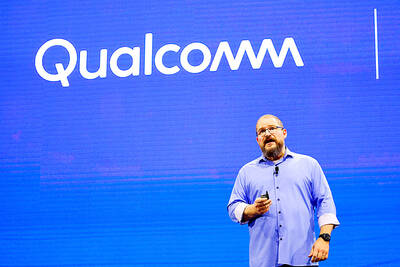The world's two largest contract chipmakers Taiwan Semiconductor Manufacturing Co (TSMC, 台積電) and United Microelectronics Corp (UMC, 聯電) yesterday reported their strongest monthly sales in the past two quarters, strengthening the belief that chipmakers are well on the way to a strong rebound this quarter.
TSMC said that sales surged 58.1 percent to NT$22.45 billion (US$679 million), compared with NT$14.2 billion in March, making it the highest level since October when the global economic slump began taking its toll on electronics consumption. However, sales last month still represented a 22.2 percent decline year-on-year.
UMC said last month's sales grew 51.44 percent to NT$6.88 billion from March*s NT$4.54 billion, but dropped 19.29 percent from a year ago. Last month's sales for the firm were also at their highest level since October.
※TSMC and UMC have slightly beat my forecast,§ said head of Fubon Securities Investment Services Co (富邦證券), Kenneth Lee (李克揚), who had expected TSMC and UMC to report NT$20 billion and NT$6.5 billion in sales last month.
※The sales growth reflects the effect of rush orders widely talked about in February,§ Lee said. ※Assuming the chipmakers meet their second-quarter guidance, monthly growth may slow down in May and June.§
On April 30, TSMC forecast that sales may expand more than 80 percent to between NT$71 billion and NT$74 billion in the current quarter from last quarter, exceeding the expectation of 70 percent quarterly growth by most analysts including Lee.
The chipmaker said it was seeing significant rebound in orders and demand from all sectors including communications, 〝computers and consumer electronics.
UMC predicted that wafer shipments would more than double this quarter from last quarter, which may also drive up its revenues by 107 percent quarter-on-quarter to NT$22.46 billion in the April-to-June period, Credit Suisse said.
TSMC shares dropped for four straight trading sessions to NT$56.30 yesterday, while the stock price of UMC fell for a second trading session in a row to NT$14. The benchmark TAIEX has rallied for seven straight days on expectations the government will open the financial sector to China.

Intel Corp yesterday reinforced its determination to strengthen its partnerships with Taiwan’s ecosystem partners including original-electronic-manufacturing (OEM) companies such as Hon Hai Precision Industry Co (鴻海精密) and chipmaker United Microelectronics Corp (UMC, 聯電). “Tonight marks a new beginning. We renew our new partnership with Taiwan ecosystem,” Intel new chief executive officer Tan Lip-bu (陳立武) said at a dinner with representatives from the company’s local partners, celebrating the 40th anniversary of the US chip giant’s presence in Taiwan. Tan took the reins at Intel six weeks ago aiming to reform the chipmaker and revive its past glory. This is the first time Tan

Qualcomm Inc is strengthening its partnerships with Taiwan Semiconductor Manufacturing Co (TSMC, 台積電) and original design manufacturers (ODMs) in Taiwan as it expands its presence in the artificial intelligence (AI) computer market, CEO Cristiano Amon said in Taipei yesterday ahead of the annual Computex trade show. “Historically we’ve always been a very big customer of TSMC, and we continue to be,” Amon said during a media Q&A session. “For chip manufacturing, we’re among the largest fabless [semiconductor designers],” he said, noting that Qualcomm, a leading provider of mobile and AI-enabled chipsets, ships about 40 billion components every year, with TSMC being

‘FAILED EXPORT CONTROLS’: Jensen Huang said that Washington should maximize the speed of AI diffusion, because not doing so would give competitors an advantage Nvidia Corp cofounder and chief executive officer Jensen Huang (黃仁勳) yesterday criticized the US government’s restrictions on exports of artificial intelligence (AI) chips to China, saying that the policy was a failure and would only spur China to accelerate AI development. The export controls gave China the spirit, motivation and government support to accelerate AI development, Huang told reporters at the Computex trade show in Taipei. The competition in China is already intense, given its strong software capabilities, extensive technology ecosystems and work efficiency, he said. “All in all, the export controls were a failure. The facts would suggest it,” he said. “The US

NEW PRODUCTS: MediaTek has been diversifying its product lines to minimize operational risks as mobile chips remain the company’s biggest revenue source MediaTek Inc (聯發科), the world’s biggest supplier of smartphone chips, yesterday said the tape-out process for its first 2-nanometer chip would take place in September, paving the way for volume production of its most advanced chip, likely to be its next-generation flagship smartphone chip, around the year-end at the earliest. MediaTek has been leveraging advanced process technologies from its foundry partner, Taiwan Semiconductor Manufacturing Co (TSMC, 台積電), to build its flagship mobile phone chips, a segment it once relinquished and then recovered four years ago as it released its Dimensity series. In the semiconductor industry, a tape-out refers to the